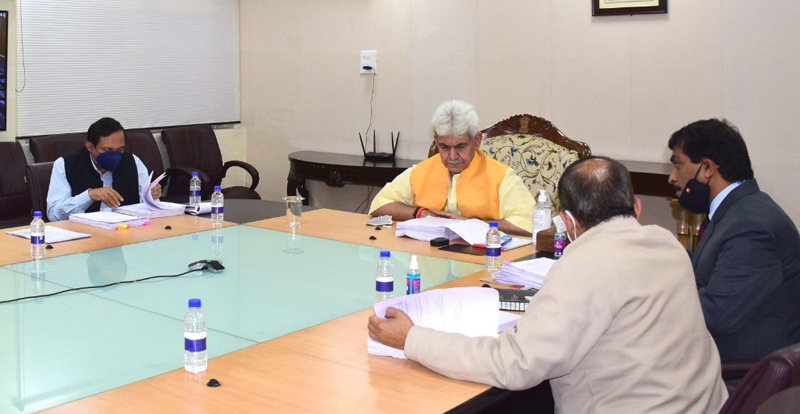Decks cleared for new terminal at Jammu airport
Excelsior Correspondent
SRINAGAR, Oct 8: In a significant decision, the Administrative Council (AC) which met here under the chairmanship of Lieutenant Governor, Manoj Sinha, gave nod to transfer of State land measuring 974 kanals & 2 marlas at village Rakh Raipur in Jammu, in favour of Airport Authority of India (AAI) free of cost for establishment of new terminal at Jammu airport.
Farooq Khan and Rajeev Rai Bhatnagar, Advisors to the Lieutenant Governor, Dr. Arun Kumar Mehta, Chief Secretary, J&K and Nitishwar Kumar, Principal Secretary to the Lieutenant Governor attended the meeting.
Establishment of new terminal will significantly enhance the capacity of the Jammu Airport in handling air traffic which will boost tourism, economy and generate employment opportunities.
The decision comes in line with the policy of the Government to promote the growth of Indian aviation sector in a significant manner so as to ensure a multiplier effect on the economy. The Government aims to provide an ecosystem for harmonised growth of various aviation subsectors, including Airlines, Airports, Cargo, Maintenance Repairs and Overhaul services (MRO), General Aviation, Aerospace Manufacturing and Skill Development.
The Administrative Council also approved the proposal of winding up the Gazetteers Unit, Srinagar.
The decision has been taken to give effect to the recommendations of the Committee headed by the Administrative Secretary, Higher Education Department, which was constituted to evaluate the functioning of the Unit. The Committee had found the Unit non-functional, having outlived its utility, but entailing an annual expenditure of Rs. 109 lakh.
The Administrative Council decided to close the Gazetteer Unit and transfer its record, office equipment, and existing staff to the General Administration Department.
Pertinently, the Gazetteer Unit was entrusted with the preparation of regional gazetteers after studying Jammu and Kashmir’s geography, economy, society, education, and social welfare through the archival records, published works, and individual studies to publish the findings in the form of a book called Gazetteer.
Meanwhile, the Administrative Council has accorded sanction to the proposal of the Public Works (R&B) Department for the adoption of Jammu and Kashmir Road Maintenance Policy, 2020-21 and along with the standard operating procedure for maintenance of road network in Jammu and Kashmir. The new policy will help in timely maintenance of roads and repair of potholes before deterioration of entire road stretches.
The Department was also authorized to purchase requisite numbers of two-wheelers costing up to Rs. 2.00 crores during the current financial year.
The decision aims at scientifically maintaining the J&K’s gross road length of 41,600 km. Moreover, with the completion of PMGSY I & II, as well as other projects under the languishing project scheme, the road network is expected to reach 46,000 km length by 2022 which would require dedicated maintenance.
The new road maintenance policy will provide a guiding framework for establishing objectives, making arrangements for, and setting up a set of procedures for undertaking maintenance and repair works by PWD. It lays down norms for maintenance of roads covering routine, periodic, and emergency maintenance by respected provincial RMMC.
The policy provides for upgrading cross drainage systems of roads; ensuring timely clearances and repair works for proper maintenance of roads; getting repair works done during and after the completion of defect liability period; implementing audit of roads and bridges besides ensuring road safety measures on critical spots; and regular inspection of roads by the field staff through visits as per a standard schedule.
Additionally, the policy also includes provisions for empowering the field staff to ensure fortnightly site inspections and reporting; restoring potholes and craters having within 7 days by mobile teams, and introducing the latest technology and gadgets including digital survey vehicles for speedy and precise assessment of road conditions.


